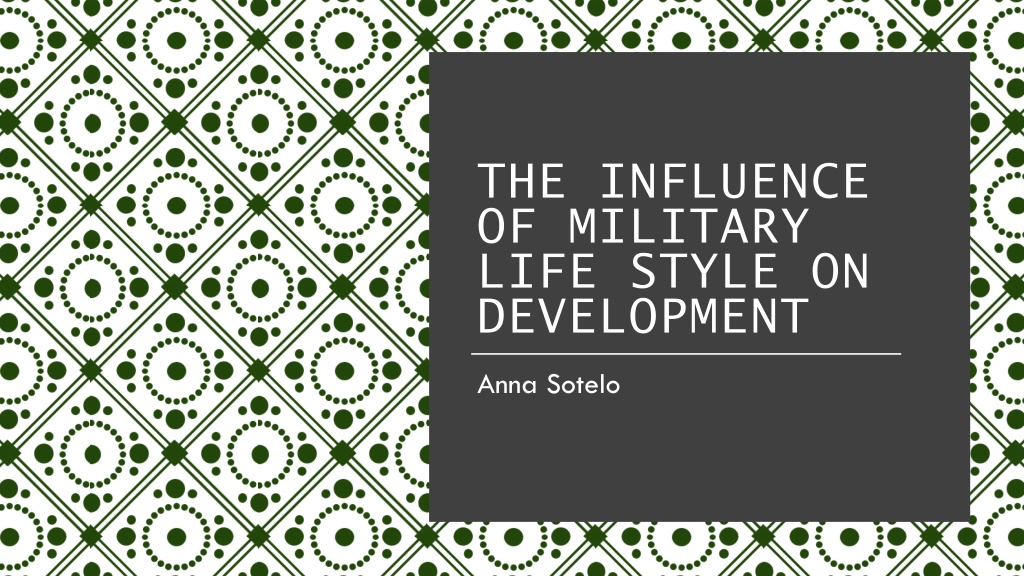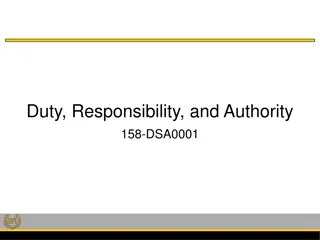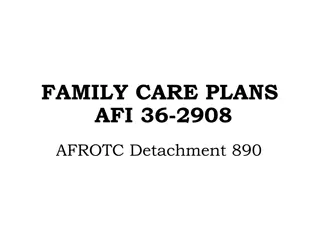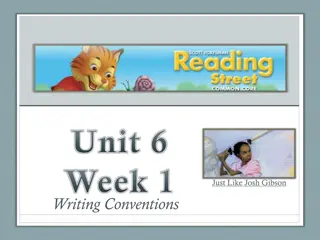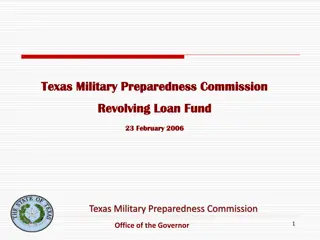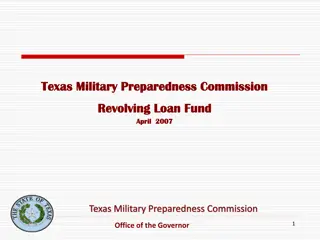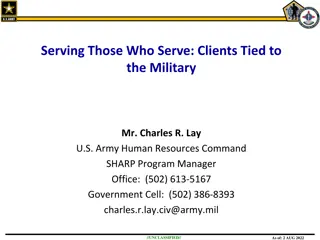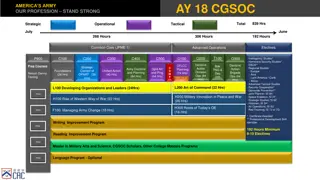Impact of Military Life on Child Development: A Case Study of Josh
Explore the influence of military lifestyle on the physical, social, and emotional development of children like Josh, whose dad serves in the Army. Discover the effects of parental deployment, frequent relocations, and strategies for maintaining healthy relationships and managing behavioral challenges.
Download Presentation

Please find below an Image/Link to download the presentation.
The content on the website is provided AS IS for your information and personal use only. It may not be sold, licensed, or shared on other websites without obtaining consent from the author. Download presentation by click this link. If you encounter any issues during the download, it is possible that the publisher has removed the file from their server.
E N D
Presentation Transcript
THE INFLUENCE OF MILITARY LIFE STYLE ON DEVELOPMENT Anna Sotelo
MEET JOSH! He is 8 years old. (Middle Childhood) He is the oldest of 3. His dad is in the Army. The military is very important in his family because his grandfather was also in the military along with his father. His dad has been deployed two times within his life. He has moved three times. He has been to two schools.
RESEARCH QUESTIONS How does the parent in the military being deployed affect the relationship between them and their child? If it does, what are some parenting strategies to ensue that they have a good relationship? How does this separation affect their other relationships? If the family is relocated often, how does changing school systems affect their cognitive development? How does it affect their social development?
PHYSICAL DEVELOPMENT Biological changes that occur in the body and brain, including changes in size and strength, integration of sensory and motor activities, and development of fine and gross motor skills. At age 8, boys are maturing in height, weight, and motor skills. It is important that they have a balanced and healthy diet, a good amount of physical play, and sleep. Example: A special activity that Josh and his dad did growing up was throw the baseball around in the backyard. Whenever his dad his home, he makes it a point to go throw the baseball around in the backyard. Since his dad knows the importance of physical activity and exercise due to his time in the military.
SOCIAL- EMOTIONAL DEVELOPMENT Changes in the ways we connect to other individuals and express and understand emotions.
SOCIAL- EMOTIONAL DEVELOPMENT: BEHAVIOR Constant deployments puts a strain on the child s development due to the disruption in their schedule. The effect of parental deployment in previous wars has shown children having an increase in behavioral problems (Countryman, James 2012). Through a composite case, Children (age 3-5) typically show more externalizing symptoms (Countryman, James 2012). Externalizing behaviors are problems that are directed toward the external environment. Example: Josh was playing a board game on a play date with his friends. When he lost, he threw the board across the room and stomped away.
SOCIAL- EMOTIONAL DEVELOPMENT: RELATIONSHIPS The time spent away from their child can put a strain on their relationship and affect the level of attachment between the parent and the child. Older children also suffer from the stress, sorrow, or anger endangered by separations, but they have more coping capacity and the ability to take on responsibilities in the absence of a parent (Masten 2013). Many fathers reported their child showed difficult attachment behaviors upon their return home, including fearfulness and need for constant contact (Stepka, Callahan 2016). Example: Josh s dad came home from his second deployment when he was 6. At first, Josh was very stand offish. He only wanted his mom to put him to bed and when his dad asked if he wanted to play ball, he declined.
COGNITIVE DEVELOPMENT The changes in the way a person thinks, understands, and reasons about the world.
COGNITIVE DEVELOPMENT Changing schools can cause a gap in the child s cognitive development due to different curriculums and international education systems. Continuity is the single biggest challenge military families face when it comes to educating their kids (Shafer, Walsh, Weber 2016). The key challenges that will surface in the classroom are adjustment issues due to frequent moves and behavioral concerns due to deployment (Cotton 2016).
COGNITIVE DEVELOPMENT Example: Josh is in third grade. His family had just finished moving for the third time and it was his first week at the new school. Due to having attended three different schools, each with a different curriculum, Josh was confused and unable to add or subtract mixed numbers, which was what his fellow students were being tested on at the time. The constant shift caused gaps in the consistency of his education which hindered his cognitive development. Finally, feeling behind from the start, Josh had a difficult time adjusting to his school.
PSYCHOSOCIAL THEORY OF DEVELOPMENT A theory of development created by Erik Erikson who suggests that children will experience different social conflicts from infancy to adulthood that will impact their development. His theory emphasizes the influence of a person s interaction with all the varying factors of their environment. The stage that Josh is in is Industry vs. Inferiority. In this stage Josh will either feel a sense of competence in relation to skills and tasks or like a failure with a lack of confidence. For all stages, Josh s environment is incredibly important for the success of the conflict in that stage.
PSYCHOSOCIAL THEORY OF DEVELOPMENT Example: Josh got a rocket kit for his birthday. He didn t wait for his mom or dad to help him build the rocket. He prepared to launch it for them and when he did, it didn t go off. He must of done something wrong. Industry: His mom and dad didn t care that it didn t go off but were impressed with his ability to assemble the rocket even though some of the wiring was wrong and didn t go off. They went to the store and bought him another one so he could try again. And Josh wanted to try again. Inferiority: His mom and dad were upset with Josh that he did it without supervision because he wasted the kit. Josh noticed that they were upset with him. The next time Josh got an engineering kit he didn t want to do it.
ECOLOGICAL SYSTEMS THEORY OF CHILD DEVELOPMENT Bronfenbrenner was a big proponent in understanding the environment surrounding a person and how they interact with the environment to be able to understand how they develop. He classified five systems that impact the development of an individual. They are microsystem, mesosystem, exosystem, macrosystem, and chronosystem. The exosystem are areas of a person s life that they never enter but still affects their development. One of the exosystem sin Josh s environment is the military.
ECOLOGICAL SYSTEMS THEORY OF CHILD DEVELOPMENT Example: Josh has never been in the military but his life has been affected by his dad s career in the military. He has become very schedule oriented, follows rules, and he needs a routine. Even though his dad has had to leave because of the military, he still wants to be in the military.
SURPRISING BENEFITS OF THE MILITARY LIFESTYLE FOR CHILDREN Language Proficiency Adventures and Increased Opportunities Flexibility Maturity and Resilience Social Skills Community Inclination toward Service Educational Scholarships
IMPORTANT PERSONAL FINDINGS The military lifestyle holds the capacity to greatly harm the child s development but it also has the possibility to set them up for great things. The military lifestyle only presents new challenges for parents to address and handle when raising their child. Therefore, I think that the parents parenting style and their ability to adapt to the difficulties that the military lifestyle presents holds the greatest impact on the child s development.
Cotten, C. (2016, October). The Challenges of the Military Child. Retrieved from https://www.militarychild.org/upload/files/resources/16OTM_Challenges.p df James, T., & Countryman, J. (2012, February). Psychiatric effects of military deployment on children and families: The use of play therapy for assessment and treatment. Retrieved from https://www.ncbi.nlm.nih.gov/pmc/articles/PMC3312898/ Learning-Liftoff-Staff. (2018, April 16). 8 Benefits of Being a Military Child. Retrieved from https://www.learningliftoff.com/8-benefits-of-being-a- military-child/ Masten, A. S. (2013, Fall). Afterword: What We Can Learn from Military Children and Families. Retrieved from https://pdfs.semanticscholar.org/8ef9/482fb284cfc84c5bf8419004d2e2 4dbdf29c.pdf Ruff, B. S., & Keim, M. A. (n.d.). Revolving Doors: The Impact of Multiple School Transitions on Military Children. Retrieved from http://tpcjournal.nbcc.org/revolving-doors-the-impact-of-multiple-school- transitions-on-military-children/ Shafer, L., Walsh, B., & Weber, M. (2016, November 9). For Military Kids, Resilience and Challenges. Retrieved from https://www.gse.harvard.edu/news/uk/16/11/military-kids-resilience-and- challenges Stepka, P., & Callahan, K. (2016). The Impact of Military Life on Young Children and Their Parents. REFERENCES
